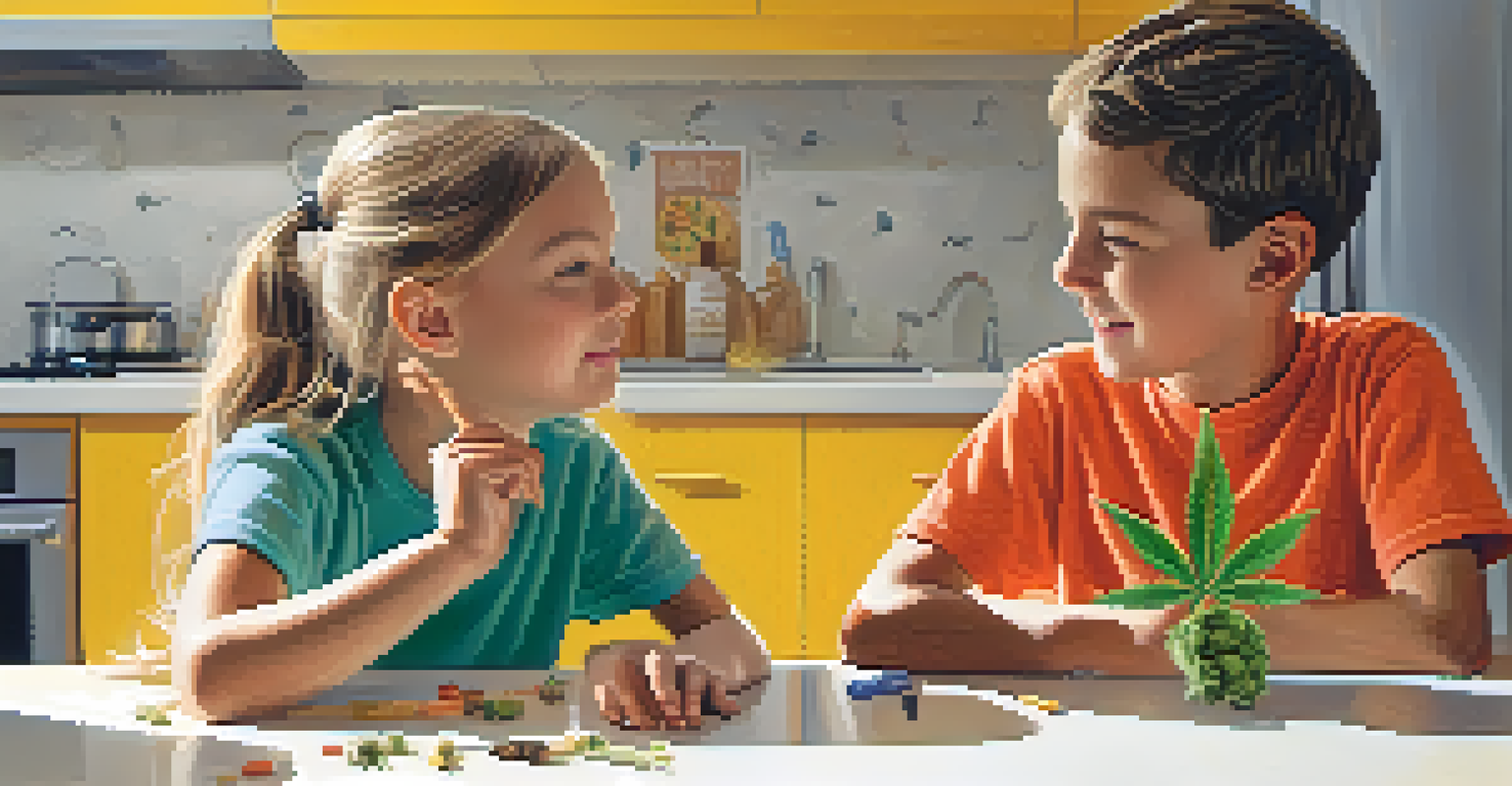Impact of Cannabis on Sibling Relationships and Rivalries

Understanding Sibling Relationships in Context
Sibling relationships can be complex, often blending love, competition, and rivalry. These dynamics are influenced by various factors, including family environment, age differences, and social interactions. When cannabis enters the picture, it can shift these dynamics in unexpected ways, sometimes bringing siblings closer together or creating new tensions.
Siblings can be the greatest source of support, but they can also be a source of conflict, especially when it comes to something as multifaceted as cannabis.
For instance, siblings may bond over shared experiences with cannabis, such as using it recreationally or exploring its medicinal benefits together. This shared experience can foster a sense of camaraderie and understanding, helping to bridge gaps that may have existed previously. However, it's essential to recognize that not all interactions with cannabis will have a positive effect on sibling relationships.
On the flip side, cannabis use can also exacerbate existing rivalries. If one sibling feels that the other is abusing cannabis or making unhealthy choices, it can lead to conflicts and resentment. This highlights the dual nature of cannabis's impact, serving as both a potential unifier and a source of discord.
The Role of Age and Maturity in Cannabis Use
Age plays a crucial role in how siblings experience cannabis, particularly when it comes to maturity levels. Younger siblings might look up to their older siblings and may feel pressured to partake in cannabis use, even if they are not ready. This can create a power imbalance, where the older sibling may unintentionally influence the younger one’s choices.

Conversely, older siblings may feel a sense of responsibility to guide their younger siblings through their cannabis experiences. This can lead to meaningful discussions about responsible use, fostering trust and open communication. However, if the older sibling exhibits reckless behavior, it can push the younger sibling away and create feelings of resentment or betrayal.
Sibling Bonds and Cannabis Use
Cannabis can create shared experiences that strengthen sibling relationships but may also lead to conflict depending on individual choices.
Ultimately, age and maturity significantly shape how siblings navigate their relationship concerning cannabis. Recognizing these differences can promote healthier interactions and help prevent misunderstandings.
Cannabis as a Tool for Connection
In some cases, cannabis can serve as a tool for connection among siblings. Sharing a joint or engaging in activities like cooking with cannabis-infused ingredients can create shared memories and experiences. This bonding over cannabis can strengthen relationships, allowing siblings to explore their interests and personalities together.
The bond between siblings is a unique one that can be both fragile and resilient, often influenced by shared experiences like cannabis use.
For example, siblings might find joy in experimenting with cannabis cooking or crafting their own products. These shared activities can act as a means of communication, breaking down barriers and fostering a deeper understanding of each other's lives. The relaxed atmosphere that cannabis can create may also encourage more open conversations about personal issues or family dynamics.
However, it’s important to strike a balance. While cannabis can enhance connections, it should never replace genuine communication or emotional support. Siblings should be mindful of their interactions to ensure that cannabis use is contributing positively to their relationship.
Navigating Rivalries Fueled by Cannabis
Sibling rivalries can be common, but cannabis may add an extra layer of complexity. For some, the competitive spirit surrounding cannabis use can lead to one-upmanship—who can roll the best joint or who has the most extensive knowledge about strains. This competitive edge can strain relationships if not approached with humor and goodwill.
In certain situations, cannabis may also become a point of contention. If one sibling feels that the other is consuming cannabis excessively or irresponsibly, it can lead to arguments and hurt feelings. Recognizing that cannabis can be a double-edged sword is crucial in navigating these rivalries, as it highlights the importance of respectful dialogue.
Impact of Age on Cannabis Dynamics
Age and maturity levels significantly influence how siblings engage with cannabis, affecting their interactions and relationship dynamics.
Ultimately, it’s essential for siblings to communicate openly about their feelings towards cannabis. By addressing concerns and celebrating each other’s successes, they can turn rivalry into healthy competition, strengthening their bond in the long run.
The Influence of Family Attitudes on Sibling Dynamics
Family attitudes towards cannabis can significantly shape how siblings interact with each other. In homes where cannabis is viewed positively, siblings might feel more comfortable exploring its use together, leading to shared experiences and bonding opportunities. Conversely, negative attitudes may create a sense of secrecy or rebellion, complicating sibling relationships further.
For instance, if parents openly discuss cannabis use and its effects, siblings may feel empowered to share their experiences without fear of judgment. This open dialogue can foster trust and transparency, reducing the likelihood of rivalry over differing opinions on cannabis. However, if cannabis is stigmatized within the family, siblings may hide their use, leading to feelings of isolation.
Understanding and addressing family attitudes towards cannabis is key to promoting healthier sibling relationships. Open conversations about cannabis can help siblings navigate their experiences together and mitigate the impact of negative perceptions.
Legalization and Its Impact on Sibling Relationships
The legalization of cannabis in various regions has transformed how siblings approach the substance. With reduced stigma and increased accessibility, many siblings find themselves exploring cannabis together in a more open and socially acceptable context. This shift can lead to more honest conversations and collaborative experiences.
However, legalization can also spark new rivalries or tensions, particularly if siblings have differing views on cannabis use. For example, one sibling may fully embrace cannabis culture, while another remains skeptical or resistant. This divergence can lead to misunderstandings or feelings of judgment, impacting their relationship.
Family Attitudes Shape Interactions
Family views on cannabis play a crucial role in sibling relationships, with open discussions fostering trust while negative attitudes may lead to secrecy.
As cannabis legalization continues to evolve, it’s essential for siblings to navigate these changes together. By respecting each other’s perspectives and finding common ground, they can continue to strengthen their bond amidst shifting societal norms.
The Bigger Picture: Cannabis and Mental Health
Cannabis is often discussed in the context of mental health, and its impact on sibling relationships can be equally significant. For some, cannabis may serve as a coping mechanism, helping to alleviate anxiety or depression. When siblings share this experience, it can deepen their understanding of each other's struggles and foster empathy.
However, it’s vital to approach cannabis use with caution, especially regarding mental health. If one sibling uses cannabis as a primary coping strategy, it may prevent them from seeking healthier outlets or support systems. This can create a dependency that strains their relationship with others, including siblings.

Ultimately, siblings should be aware of the potential mental health implications of cannabis use. By encouraging each other to seek help and maintain open communication, they can navigate their relationship more effectively and promote overall well-being.